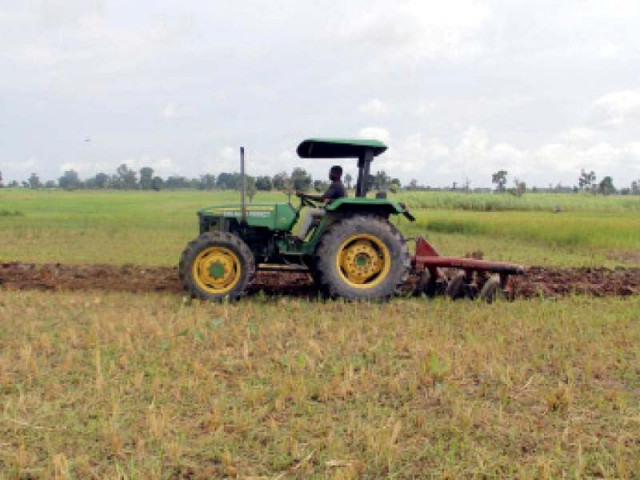Agri-sector performs below par
Despite meeting targets, country continues to import commodities

Despite surpassing production targets of select crops, the performance of the agriculture sector of Pakistan remained dismal during 2021 mainly owing to bad governance and imports of a staple food item, ie wheat.
During 2020-21, Pakistan imported around 3.6 million tons (valuing at $983.3 million) of wheat. Despite having a bumper crop, which stood at 27.5 million tons, the economic managers kept on importing the commodity from the international market to manage the food security issue.
From July to November 2021, the government imported around 0.95 million tons (worth $340.1 million) of wheat.
Sugar also portrays a similar picture. As per official figures, the country produced around 7 million tons of sugar and the Pakistan Sugar Mills Association (PSMA) expects output of up to 5.9 million tons in the upcoming season.
Despite this, the country imported around 307,855 tons ($188.5 million) of sugar during July-October 2021. In 2020-21, a total of 281,321 tons ($128.65 million) of the commodity was imported.
The overall production was satisfactory, as according to the Economic Survey of Pakistan 2020-21 the agriculture sector grew 2.77% against the target of 2.8%.
During the year, the growth of important crops, ie wheat, rice, sugarcane, maize and cotton, stood at 4.65%.
Compared with the previous year, the production of sugarcane increased 22% to 81.01 million tons from 66.38 million tons, rice harvest rose 13.6% to 8.42 million tons from 7.41 million tons and maize output grew 7.4% to 8.46 million tons from 7.88 million tons.
However, the cotton output dropped 22.8% to 7.06 million bales from 9.15 million bales in the previous year.
Still the bumper harvests and massive imports of essential food items failed to manage the rising inflationary pressure.
The country has been witnessing a continuous uptrend in prices of basic commodities like wheat/ flour, sugar, edible oil and vegetables throughout the year, creating a feeling of disappointment when it comes to managing the agricultural affairs and food security issues.
Agricultural experts are now terming the rising input costs alarming and a threat to national food security, since the inflationary wave is a global phenomenon and farmers of developing and less developed countries are facing a similar situation. This could have a negative impact on the international commodity prices, especially wheat.
“The price of main input, ie di-ammonium phosphate (DAP) fertiliser, is touching Rs10,000 per 50kg bag,” lamented Pakistan Kissan Ittehad President Khalid Khokhar, adding that increasing rates of electricity and diesel were an additional burden on the farmers.
Talking to The Express Tribune, Khokhar remarked that food security had replaced border security as the country’s biggest challenge for at least the next 10 years. “Urea is costly and it may result in less production, if we consider the entire inflationary trend,” he said.
India was facing a similar situation.
“The international price of wheat can shoot up due to demand-supply imbalances in the coming year,” Khokhar underlined.
One solution was to increase the support price to encourage farmers to production more, at least the staple crop, he suggested. Former Pakistan Agricultural Research Council chairman Dr Yusuf Zafar was of the view that business-as-usual was no longer a viable strategy as more international institutions considered a bleak future of food security in Pakistan that would be much different than the present situation.
According to him, the first and foremost cause of pushing Pakistan from surplus to scarcity is bad governance.
Repeated changes of federal secretary/ additional secretaries of the Ministry of National Food Security and Research made things worse, he added.
“The second cause of our downward trajectory in food security is the absence of active and effective coordination between the federal ministry and provincial agricultural departments,” he said.
“After the 18th Amendment, the situation at the provincial level is more fragmented and complex.”
“Therefore, the much-touted Agriculture Emergency Programme of over Rs300 billion, launched by the PTI government in 2019, is destined for failure as the fund distribution formula was 60:40 between provinces and the federal government,” Zafar explained.
The recent impasse between Sindh and the Indus River System Authority (Irsa), a federal government department, over water distribution during the sowing season “speaks volumes about such discord”, he added.
Other programmes of international development partners were suffering long delays and repeated interruptions and were mostly rated below average progress or unsatisfactory performance, he underlined.
“Locust management loan of $200 million has been delayed for over a year,” he pointed out.
“Similarly, the SMART project of the World Bank ($300 million) under the Punjab government is also much deviated from the 13 performance-based reimbursement indicators.”
The ETI project of the International Fund for Agricultural Development (IFAD) – $120 million – in Gilgit-Baltistan was coming to a close with many objectives yet to be met, Zafar added.
The final major cause, according to him, was the “ill-planned and ill-designed” Agriculture Transformation Plan at the federal and Punjab levels.
Stakeholders agree that food security is a complex and sensitive issue as provision of sufficient and nutritious food to citizens is a constitutional responsibility of the state.
Agriculture is an open industry and its supply chain from farm to fork is long and complicated.
Following the simple issue of demand and supply along with transparent and strong regulations supported by a robust information technology system and traceability at every step is the only workable solution for a sustainable supply of food items.
Published in The Express Tribune, December 30th, 2021.
Like Business on Facebook, follow @TribuneBiz on Twitter to stay informed and join in the conversation.



















COMMENTS
Comments are moderated and generally will be posted if they are on-topic and not abusive.
For more information, please see our Comments FAQ